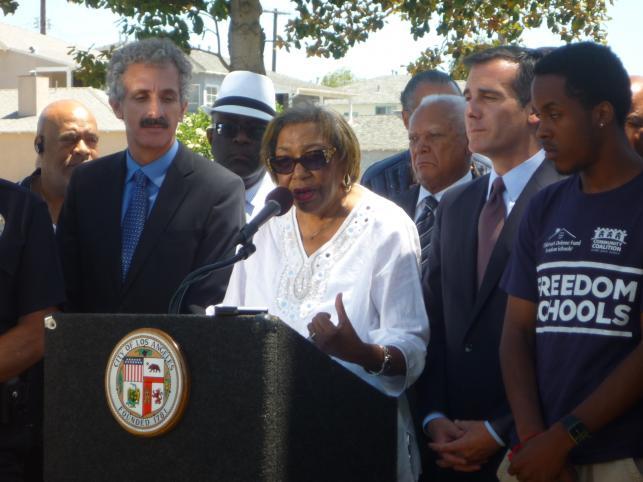The Struggle Marguerite Lamotte, Nelson Mandela Fought for Continues

Marguerite Lamotte, the senior member on the board of the Los Angeles Unified School District, died last week. So did Nelson Mandela. I am not ranking them in importance, obviously, this is just the order in which I heard the news. Lamotte held the most local of elected offices in an American big city, Mandela was an icon and internationalist whose extraordinary story and forbearance long ago transcended politics and place; although from South Africa, he belonged to everyone.
Still, I couldn't resist thinking about how both Lamotte and Mandela shared in common the fact they were black leaders of a certain generation who saw themselves as fighters for racial equality in their respective countries.
Marguerite Lamotte waged the fight through public education, the means by which blacks in America were expected to finally level the playing field by integrating the decent public schools historically and legally reserved for whites. The problem is that integration never really happened, and the largely black, inferior schools created by segregation have remained black and inferior.
In L.A., those schools have become far less black and much more Latino over the years, but underneath the demographic shift, the racial reality is the same: statistically and performance-wise, black students are the bottom. This conundrum of the post-desegregation era is what confounded leaders like Lamotte. At 80, she was old enough to have lived through segregated schools and to understand that the effects lingered, but she was hard-pressed, and sometimes reluctant, to address those effects through policy that explicitly addressed the needs of black students. Since Brown vs. Board of Education, no one has wanted to believe that blacks are denied a quality education -- after all, there are no more white supremacists blocking the schoolhouse door. We now have social mobility, which includes educational mobility.
But of course, mobility's been the problem. People move to places where the schools are good (read: not black), and those who can't move continue to suffer crappy schooling. Magnet schools and busing programs alleviate the problem somewhat, but they're limited. And they extract a cost of their own -- students going out of their own neighborhoods to "better" schools weaken the prospects of those neighborhoods ever really getting better. We now abandon places without leaving them. Charter schools, which Lamotte opposed, are often local, but they are selective and by definition reject the social contract that all of us once had with public schools. Black parents sick of failure are often the first to do the rejecting. Such is the complex relationship between education and the unfinished business of freedom and racial justice that Lamotte tried (and frankly often failed) to negotiate as a board member in the modern era. Negotiating it in the so-called post-racial age was even tougher.
Nelson Mandela came to prominence fighting a nakedly racist white minority government that had no pretensions of democracy, equality, or social mobility. That apartheid government didn't fall until 1994, half a century after the Brown vs. Board of Education, and two years after the civil unrest erupted here in L.A., the costliest unrest in American history. We are still paying for racial inequality in the streets, in the schools, on both sides of the Atlantic. Two black leaders with very different profiles who died today would likely agree on that.